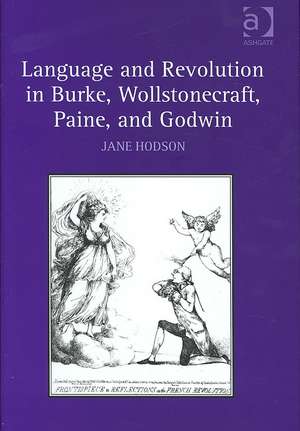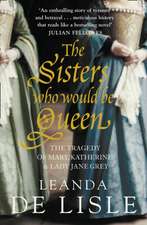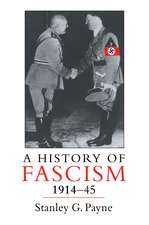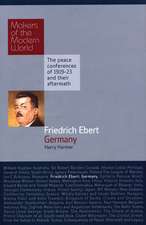Language and Revolution in Burke, Wollstonecraft, Paine, and Godwin
Autor Jane Hodsonen Limba Engleză Hardback – 28 iun 2007
Preț: 1054.71 lei
Preț vechi: 1286.24 lei
-18% Nou
Puncte Express: 1582
Preț estimativ în valută:
201.87€ • 209.95$ • 169.17£
201.87€ • 209.95$ • 169.17£
Carte tipărită la comandă
Livrare economică 13-27 martie
Preluare comenzi: 021 569.72.76
Specificații
ISBN-13: 9780754654032
ISBN-10: 0754654036
Pagini: 226
Dimensiuni: 156 x 234 x 14 mm
Greutate: 0.45 kg
Ediția:New.
Editura: Taylor & Francis
Colecția Routledge
Locul publicării:Oxford, United Kingdom
ISBN-10: 0754654036
Pagini: 226
Dimensiuni: 156 x 234 x 14 mm
Greutate: 0.45 kg
Ediția:New.
Editura: Taylor & Francis
Colecția Routledge
Locul publicării:Oxford, United Kingdom
Cuprins
Contents: The language of politics and the politics of language; The linguistic background; 'A wilderness of words': Edmund Burke's Reflections; 'The effusions of the moment': Mary Wollstonecraft's Vindication; 'What is this metaphor called a crown?': Thomas Paine's Rights of Man; 'The transparent envelop of our thoughts': Godwin's Political Justice; Conclusion; Bibliography; Appendix; Index.
Recenzii
'Hodson combines modern stylistic analysis (using lexical analysis software) with impressive research into the linguistic assumptions of the 1790s in order to offer challenging new insights about the language of politics and the politics of language in the key texts of the Revolution Controversy.' Tom Furniss, University of Strathclyde, UK ’Hodson’s approach reveals a critical self-awareness essential to the integrity of any such work of scholarship. She writes with astounding clarity, an aspect of her project all the more creditable for its avoidance of the cryptic jargon sometimes characteristic of technical writing.’ European Romantic Review '... helpful in suggesting new approaches in historical linguistics, whether of the Romantic or any other period.' Studies in Romanticism 'Language and Revolution in Burke, Wollstonecraft, Paine, and Godwin is a fine contribution to our understanding of the linguistic dimension of the ’war of words’, as Hodson describes the 1790s revolution controversy. It is a book crammed with new insights into the role language plays in each of its four main authors along with the social and cultural contexts of late eighteenth-century Britain more generally.' BARS Bulletin and Review
Notă biografică
Dr Jane Hodson is Lecturer in English Language and Literature at the University of Sheffield, UK.
Descriere
Jane Hodson's book explores the relationship between political persuasion, literary style, and linguistic theory in four key texts on the French Revolution by Edmund Burke, Mary Wollstonecraft, Thomas Paine, and William Godwin. Situating these texts in the context of more than 50 contemporaneous books on language, as well as pamphlets, novels, and letters, Hodson challenges the notion that the Revolution debate was a straightforward conflict between radical and conservative linguistic practices.












